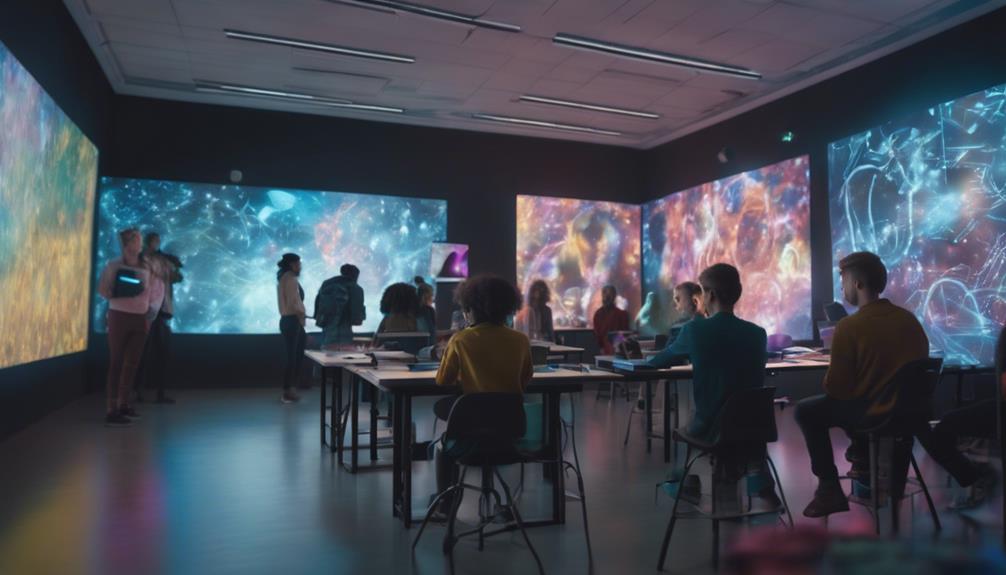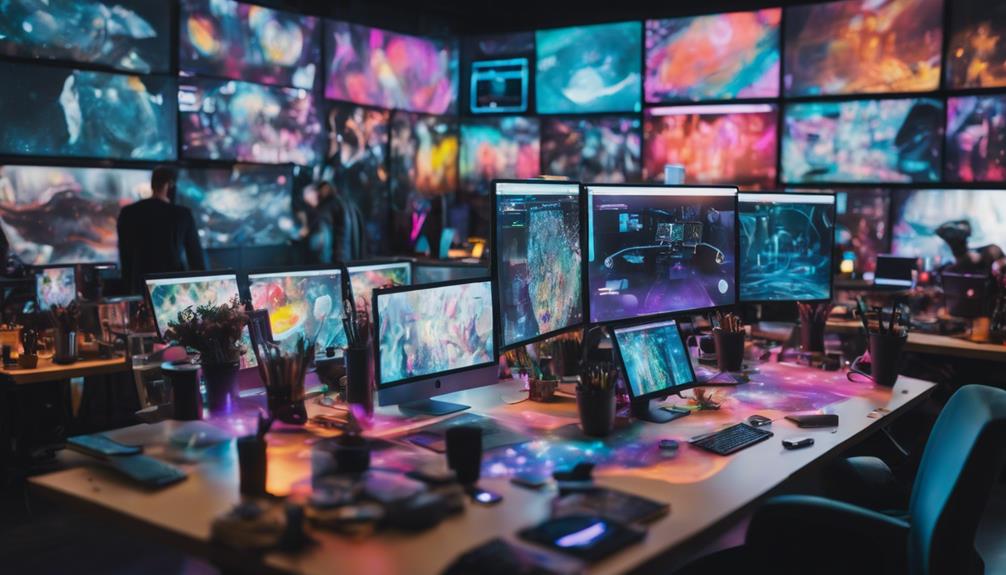AI art jobs merge creativity and technology, opening exciting opportunities for you. You can explore roles like machine learning engineer, user experience designer, or content curator, each contributing to innovative artistic projects. To succeed, you'll need a mix of technical skills, like programming and data analysis, alongside emotional intelligence for collaboration. Many positions are remote, enhancing flexibility while you bridge the gap between art and algorithm. With a vibrant job market growing rapidly, the demand for your unique talents is strong. If you're keen to learn how to prepare for a career in this field, there's much more to discover.
Types of AI Jobs

When exploring the types of AI jobs, you'll find roles like machine learning engineers and user experience designers playing significant parts in shaping the industry.
Leadership in AI projects is also essential, as it guarantees successful collaboration and innovation.
Additionally, AI content curators are important for managing and showcasing the ever-evolving landscape of AI-generated art.
Machine Learning Engineers
Machine learning engineers play an essential role in the AI art sector by crafting algorithms that generate innovative creative outputs like visual art and music. These professionals focus on developing models utilizing techniques such as Generative Adversarial Networks (GANs) and Natural Language Processing (NLP). As demand for machine learning expertise in creative industries rises, companies are actively seeking engineers who can seamlessly integrate AI tools into artistic workflows, enhancing the entire creative process.
To excel in this field, you'll need a strong foundation in computer science, mathematics, and statistics. Familiarity with software engineering and deep learning frameworks like TensorFlow and PyTorch is equally important. The job market for machine learning engineers is projected to grow considerably, with salaries likely reflecting the specialized skills required for AI development in art.
As AI-generated art gains traction, opportunities for machine learning engineers will expand across various sectors, including advertising, gaming, and entertainment. Your expertise can shape new forms of creative expression, making this an exciting and rewarding career path. Embrace the fusion of creativity and technology, and you'll be at the forefront of this evolving landscape.
User Experience Designers
User experience designers play an important role in shaping how artists and users interact with AI-generated art tools, making creativity more accessible and intuitive. By focusing on creating user-friendly interfaces, you help enhance the overall experience for both seasoned artists and those new to the creative process. Your research and testing methodologies guarantee that you understand user needs and behaviors, guiding the design of AI platforms that facilitate artistic endeavors.
You collaborate closely with artists and technologists to develop seamless workflows, integrating AI capabilities into traditional creative practices. This collaboration not only boosts artistic productivity but also enriches the user experience.
As generative AI tools gain popularity, you must prioritize ethical considerations, guaranteeing transparency in AI processes and addressing concerns around data usage and copyright.
The demand for UX designers specializing in AI is on the rise, as businesses increasingly seek to leverage AI technology to enhance user engagement. By creating personalized art experiences, you reflect broader trends in the creative job market. Your work is crucial in shaping a future where creativity and technology coexist harmoniously.
Leadership in AI Projects
Leadership in AI projects demands a unique blend of technical know-how and creative insight to effectively guide teams in harnessing AI technologies for artistic innovation. In these leadership roles, individuals need to possess both expertise in AI tools and a strong vision for how these tools can enhance artistic expression.
As a project manager, you'll oversee the development of essential technologies like Generative Adversarial Networks (GANs) and Natural Language Processing (NLP), ensuring that every initiative aligns with the creative objectives of your team.
If you take on the role of an AI art director, you'll curate and direct the aesthetic output of AI systems, bridging the gap between algorithmic generation and human artistic intent.
As a creative technologist, you'll collaborate closely with software developers and artists, specializing in implementing AI technologies that enhance creative capabilities and streamline workflows.
With the rapid evolution of AI, you'll also see new leadership roles emerging, focusing on ethical considerations and regulatory compliance in AI art projects, emphasizing the importance of responsible AI usage in creative fields.
Embrace these opportunities to lead and innovate in the thrilling intersection of art and technology.
AI Content Curators
AI Content Curators play an essential role in selecting and organizing AI-generated art, ensuring that the pieces resonate with both the artistic vision and audience engagement strategies.
In this position, you'll utilize machine learning algorithms to analyze audience preferences and trends, which helps shape the future direction of AI art collections.
As AI development continues to advance, the demand for skilled curators is expected to grow, providing you with various opportunities within the creative sector. You'll collaborate with artists, offering insights on how to effectively integrate AI tools into their workflows, enhancing the creative process.
To succeed as an AI Content Curator, you'll need a blend of artistic sensibility and technical expertise. This unique skill set allows you to navigate the complexities of AI-generated content while fostering innovation in the art community.
Skills Required for AI Jobs

To excel in AI art jobs, you need strong proficiency in programming languages and data interpretation skills.
Emotional intelligence also plays a key role, helping you collaborate effectively with diverse teams.
Let's explore these essential skills further and see how they contribute to success in the field.
Programming Languages Proficiency
Mastering programming languages like Python and R is essential for anyone aiming to excel in AI jobs. Python is pivotal in developing machine learning models and implementing AI algorithms, making it a must-know language for aspiring AI professionals. R programming, on the other hand, shines in statistical analysis and data visualization, which are vital when dealing with large datasets.
You shouldn't overlook JavaScript, either. It's becoming increasingly important in AI development, especially for web-based applications that integrate AI functionalities into user interfaces. Familiarity with C++ can also be a game changer due to its performance efficiency, especially when implementing complex AI models and real-time applications.
Additionally, diving into specialized programming languages like Racket or Julia can enhance your skill set. These languages offer unique advantages for specific AI tasks, such as symbolic computation or numerical analysis.
Data Interpretation Expertise
Understanding data interpretation is essential in the domain of AI art jobs, as it enables you to effectively analyze and manipulate large datasets for training models. Your data interpretation expertise directly impacts the quality and creativity of AI-generated art. Familiarity with machine learning algorithms, like Generative Adversarial Networks (GANs), is critical for creating and evaluating these artistic outputs.
You'll also need to know programming languages such as Python and R, which are key for implementing data-driven techniques in your projects. Furthermore, understanding ethical considerations in data sourcing is crucial. Using diverse and representative datasets helps avoid bias, ensuring responsible AI and technology practices in art creation.
Additionally, skills in data visualization are significant. They allow you to communicate complex insights and artistic concepts to both technical and non-technical audiences, bridging the gap between creativity and analytics.
In this rapidly evolving field, honing your data interpretation skills not only enhances your capabilities but also positions you as a valuable asset in the AI art job market. Embrace these skills, and you'll be well-equipped to thrive in this innovative intersection of art and technology.
Emotional Intelligence in Collaboration
Emotional intelligence plays a pivotal role in enhancing collaboration between artists and AI, enabling you to navigate the complexities of creative expression more effectively.
In the domain of AI art, understanding the nuances of human emotions is vital, as it helps you interpret AI outputs in a way that resonates with your vision. Skills like empathy, active listening, and adaptability are essential for you to work harmoniously with AI technologies.
Research shows that teams with high emotional intelligence often outperform their peers, leading to better innovation and problem-solving in creative projects. When you can manage interpersonal dynamics and articulate your feedback clearly, you refine AI-generated outputs and guarantee they align with your artistic intent.
Moreover, emotional intelligence promotes a more ethical approach to AI art. It empowers you to address concerns surrounding authorship and the influence of AI on traditional practices.
Education and Training for AI Jobs

To succeed in AI art jobs, you need the right education and training.
Emerging technologies in AI art are reshaping how you learn, with programs combining art and computer science to prepare you for the future.
Online certifications and hands-on workshops can help you master the tools and techniques that are becoming essential in the creative industry.
Emerging AI Art Technologies
Many educational programs now equip artists with the skills to effectively integrate AI tools into their creative processes. As the creative industries evolve, institutions are adopting curricula that include emerging AI art technologies. This prepares you for a future where working alongside AI systems is a fundamental aspect of artistic practice.
With the rise of generative AI tools, there's a growing demand for training in machine learning and data analysis. Understanding these technologies is essential for successfully incorporating them into your creative workflow. Workshops and online courses focused on AI-generated art are becoming increasingly popular, offering you hands-on experience with tools like DALL-E, Midjourney, and Stable Diffusion.
These platforms not only enhance your artistic capabilities but also help you stay competitive in a shifting market. The intersection of AI and art is set to create new job roles that require a hybrid skill set—combining artistic talent with technical proficiency in AI technologies.
Art and Computer Science Degrees
Pursuing an art and computer science degree can help you blend creative talent with technical skills, making you a prime candidate for emerging AI art roles. These interdisciplinary programs equip you with the tools needed to innovate in the creative fields, focusing on how AI can enhance artistic expression.
Many universities now offer specialized courses that explore interactive design, generative art, and machine learning applications in the arts. Your coursework will likely cover programming, data analysis, digital media, and art theory, providing a solid foundation in both the technical and artistic aspects of AI.
Additionally, internships and hands-on projects are essential components of your education. They offer valuable experience as you'll collaborate with tech companies or art institutions on AI-related initiatives.
Graduating with a strong background in art and computer science degrees positions you favorably in a competitive job market. Employers are increasingly on the lookout for individuals who can navigate the evolving landscape of creative professions influenced by AI technologies.
Online AI Art Certifications
Online AI art certifications are an excellent way to build on the skills gained from art and computer science degrees, enabling you to harness cutting-edge technologies in your creative practice. These certifications are increasingly popular among professionals looking to enhance their abilities in using generative A.I. for artistic endeavors.
Platforms like Coursera and Udemy offer specialized courses that cover essential topics, such as generative adversarial networks (GANs) and natural language processing (NLP) for storytelling.
Whether you're a beginner or an experienced creative, these programs often include practical assignments that let you create AI-generated art. By earning online AI art certifications, you can showcase your proficiency with AI technologies, a valuable asset in a job market projected to demand more workers in creative roles enhanced by AI.
Moreover, these certifications provide networking opportunities and access to communities focused on merging human creativity with technology. Engaging with fellow artists and technologists fosters collaboration and innovation.
Ultimately, investing in an AI art certification can greatly boost your career prospects and keep you at the forefront of the evolving creative landscape.
Tech Companies and Startups

Tech companies and startups are revolutionizing the creative landscape by investing heavily in AI art technologies that empower artists and enhance productivity. With platforms like OpenAI's DALL-E and Midjourney, millions of users are now accessing AI-driven tools that generate billions of images daily. These technologies not only streamline workflows but also allow you to focus on the more imaginative aspects of your work.
Emerging startups are also stepping up to support artists, offering platforms that guarantee ethical sourcing of datasets and sharing of AI-generated art. For example, Cara is designed to protect your rights against data scraping practices, making it easier for you to share your creations safely.
The rise of these AI art generation tools has opened the door to new economic opportunities, with some AI-generated pieces fetching impressive prices at auctions. As tech companies continue to integrate AI into creative processes, they're also playing a pivotal role in retraining and reskilling professionals, helping you adapt to a rapidly evolving job landscape shaped by automation.
Embrace these advancements, and you might find new pathways for creativity and success in your artistic journey.
Remote AI Jobs

As you explore remote AI job opportunities, consider how they can enhance your work-life balance.
You'll find AI-specific job boards that cater to this growing field, making it easier to connect with roles that fit your lifestyle.
Embracing remote work in AI not only broadens your options but also allows you to collaborate with diverse teams worldwide.
Work-Life Balance Considerations
In today's creative landscape, remote AI jobs offer you the flexibility to shape your work hours, promoting a healthier work-life balance. With AI tools streamlining repetitive tasks, you can focus more on innovative projects and high-level creative thinking. This shift not only enhances your productivity but also boosts your overall job satisfaction.
The rise of AI-generated art platforms has opened up a plethora of remote roles, allowing you to work from anywhere while integrating AI into your artistic practices. You can collaborate with global teams through digital platforms, diving into diverse projects without the constraints of location. This accessibility fosters creativity and encourages a rich exchange of ideas.
Reports show that 55% of creative professionals feel comfortable with remote work, indicating a growing acceptance of remote AI roles in the arts. By embracing this trend, you can achieve a better work-life balance, dedicating time to both your professional aspirations and personal life.
Ultimately, remote opportunities in AI art jobs empower you to create, collaborate, and thrive without sacrificing your well-being.
Leverage Ai-Specific Job Boards
Leveraging AI-specific job boards can greatly enhance your chances of finding remote roles that align with your creative and technical skills. These platforms, like AI Jobs and Remote AI Jobs, cater specifically to the growing demand for talent in AI technologies. Companies increasingly seek professionals who can blend creativity with technical expertise, making these job boards invaluable for your search.
As the industry evolves, job postings for AI-related positions are on the rise. You'll find opportunities for roles such as AI art directors, machine learning artists, and AI content creators, all of which emphasize the innovative collaboration between artists and AI technologies. This unique job market thrives on hybrid skill sets, so showcasing your ability to navigate both artistic and technical domains can set you apart.
Additionally, many AI-specific job boards offer flexible remote work options, allowing you to pursue your passion from anywhere. By focusing your search on these specialized platforms, you can uncover niche opportunities that reflect the interdisciplinary nature of today's creative landscape, positioning yourself at the forefront of this exciting field.
Job Growth in AI Sector

As you explore job growth in the AI sector, you'll notice how AI adoption in creative industries is reshaping the job landscape.
With trends showing a surge in demand for roles that blend creativity and technology, it's clear that opportunities are expanding.
Creative hubs are emerging to support this growth, making it an exciting time to contemplate a career in AI-related fields.
AI Adoption in Creative Industries
Transforming the creative landscape, AI technologies are driving significant job growth and reshaping roles within the industry. In 2023, the creative job market added 200,000 positions, reflecting a robust demand for talent as AI adoption in creative industries accelerates. A report by Robert Half revealed that 55% of creative and marketing managers are actively hiring for new roles, highlighting the integration of AI tools into workflows.
While many express concerns about job loss due to AI, the unemployment rates for graphic and web designers remain impressively low at 2.6% and 2.9%, respectively. This suggests that rather than eliminating jobs, AI is changing the nature of work. In fact, 69% of global marketing and creative leaders fear potential job loss, yet 97% feel comfortable using generative AI to enhance their projects.
As AI automates lower-level tasks, it's fostering demand for more complex creative roles. You're likely to find yourself focusing on higher-level creative thinking, as technology takes care of routine responsibilities. Embracing these changes can lead to exciting opportunities in the evolving creative landscape.
AI Job Market Trends
The AI job market is booming, with countless new opportunities emerging across various sectors as businesses increasingly integrate artificial intelligence into their operations.
In 2023, around 200,000 creative jobs were added to corporate payrolls, highlighting a strong demand for talent in creative industries despite concerns over AI-induced displacement. According to a report from Robert Half, 55% of creative and marketing managers are actively hiring, indicating a positive trend for job seekers.
The unemployment rates for graphic designers and web designers are impressively low, at 2.6% and 2.9%, respectively. This reflects high demand and low competition for specialized skills in these areas.
While 69% of global marketing and creative leaders worry about potential job losses due to AI, a remarkable 97% recognize the benefits of AI tools in enhancing team creativity.
As AI technology automates lower-level tasks, it creates an opportunity for more complex problem-solving roles. This intersection of AI and creativity is set to increase demand for specialized positions, ensuring that skilled professionals have a bright future in the evolving job market.
Embracing these changes can lead you to exciting career paths.
Creative Hubs for AI Jobs
Creative hubs are rapidly emerging as key centers for AI job growth, attracting talent enthusiastic to leverage technology in innovative ways.
In 2024, the demand for creative professionals is strong, with reports indicating that 55% of creative and marketing managers are actively hiring. This surge leads to the addition of around 200,000 creative jobs to corporate payrolls, reflecting a robust job market. With low unemployment rates—2.6% for graphic designers and 2.9% for web designers—opportunities in the sector continue to flourish.
Despite fears surrounding job security from Artificial Intelligence, 69% of global marketing and creative leaders recognize that AI can enhance team creativity. As AI tools allow for the customization and large-scale production of content, the need for personalized creative outputs grows, leading to more roles in various industries. Furthermore, as technology automates lower-level tasks, the complexity of problem-solving in creative professions increases, paving the way for a dynamic job market.
In these creative hubs, you'll find collaboration between humans and AI, driving innovation and ensuring that creativity and technology work hand in hand.
Salaries and Compensation

When it comes to salaries in AI art jobs, you'll find a wide range depending on experience and role.
As demand for skilled professionals rises, companies are offering competitive compensation packages to attract talent.
This shift in the industry could lead to significant salary increases and new opportunities as AI continues to evolve.
Salary Ranges for AI Positions
Salaries for AI positions in the art field can vary considerably based on experience and the complexity of the role.
Entry-level positions like AI art assistants typically earn between $50,000 to $70,000 annually. If you have more experience, you could command salaries ranging from $100,000 to $150,000 or higher as an AI artist or developer. In larger tech companies or art institutions, senior roles often exceed $160,000, particularly those involving leadership and project management.
Data scientists focusing on AI art applications usually see salaries between $90,000 and $140,000, depending on expertise and project complexity. Freelancers, such as AI art consultants, can set their rates based on project scope, charging anywhere from $75 to $300 per hour, based on reputation and demand.
As industries adapt to AI's rise, those who don't embrace technology might lose their jobs, but the essence of creativity remains essential.
Positions blending artistic skills with technical prowess, like AI-generated content strategists, often offer compensation packages that can reach between $120,000 to $180,000 annually. This landscape presents exciting opportunities for those willing to merge creativity with technology.
Industry Demand Fluctuations
The demand for professionals in the AI art sector is growing rapidly, driven by a need for innovative talent that blends creativity with technology.
As a result, creative and marketing managers are actively hiring, with 55% of them looking for new roles in 2023. This trend is reflected in the addition of 200,000 creative jobs to corporate payrolls, indicating strong industry growth despite apprehensions about AI impacting job security.
Salaries in the AI art sector are becoming increasingly competitive, particularly for those with skills in Computer Science.
With unemployment rates for graphic designers at just 2.6%, you can expect a robust job market ahead.
While 69% of global marketing leaders worry about potential job losses due to AI, an overwhelming 97% are comfortable with generative AI integration.
This shifting landscape is likely to boost compensation for roles that require a unique blend of artistic talent and technological proficiency.
How to Prepare for an AI Job

To prepare for an AI job, you should showcase diverse AI projects that highlight your skills and creativity.
Building connections at AI conferences can open doors and provide valuable insights from industry leaders.
Additionally, practicing mock interviews with AI experts will help you refine your pitch and boost your confidence.
Showcase Diverse AI Projects
Showcasing a variety of AI projects not only highlights your skills but also demonstrates your innovative approach to blending technology with art. Start by familiarizing yourself with popular AI art generation tools like DALL-E 2 and Midjourney. These platforms have gained millions of users and can create stunning images from simple text prompts, making them fundamental for your portfolio.
Next, gain proficiency in machine learning basics and neural networks. Understanding how AI algorithms analyze data is essential for generating unique artworks, especially if you want to collaborate effectively with human artists. Building a diverse portfolio that features collaborative projects between human creativity and AI tools will set you apart, showcasing your ability to leverage technology in artistic expression.
Additionally, stay updated on the ethical implications of AI in art, including copyright issues and biases in training data. This knowledge is important for making informed decisions in your future roles.
Building Connections at AI Conferences
How can you make the most of AI conferences to expand your professional network and enhance your career in the art sector?
Start by attending events like the upcoming symposium at the University of Michigan on March 5, 2024. These conferences are golden opportunities to connect with industry professionals and learn from featured speakers. Years ago, networking was often limited to in-person gatherings, but now you can engage in interdisciplinary discussions that explore collaboration between technologists and artists.
To prepare, familiarize yourself with the latest AI tools, such as DALL-E 2 and Midjourney, which are revolutionizing creative processes. Build a portfolio that highlights your ability to work with AI technologies, as this skill is increasingly coveted by employers.
Stay informed about job market trends; with 200,000 new creative positions added in 2023, there's a strong demand for talented individuals. Actively participate in practical demonstrations to showcase your skills and connect with like-minded professionals.
Mock Interviews With AI Experts
Preparing for an AI job interview means understanding key technologies and trends that can set you apart as a candidate in the art sector. Familiarize yourself with essential AI tools like Generative Adversarial Networks (GANs) for visual creations or Natural Language Processing (NLP) for literary projects. Knowing these technologies will help you articulate how they enhance artistic expression.
You should also be ready to discuss the ethical considerations surrounding AI-generated art. Topics like authorship, copyright, and the implications for traditional creative roles are vital points to touch on during interviews. Demonstrating awareness of these challenges shows you're not just tech-savvy but also thoughtful about the industry's future.
Be prepared to showcase examples of past projects where you integrated AI tools into your creative processes. Highlight how these collaborations enhanced your work instead of replacing your creativity.
Lastly, stay updated on the latest trends, like platforms such as DALL-E 2 and Midjourney. This knowledge can help you discuss current market dynamics. Emphasizing your adaptability and commitment to continuous learning will position you as a forward-thinking professional ready to navigate the evolving landscape of AI in the arts.
Frequently Asked Questions
Can AI Art Be Creative?
Yes, AI art can be creative. You'll find it generates unique ideas and styles, pushing boundaries in art. While it's a tool, your input and vision remain essential in the creative process.
Is AI Replacing Creative Jobs?
You might worry that AI's advancement is replacing creative jobs, but the reality shows a growing demand for creativity. Many roles are evolving, focusing on higher-level tasks, with AI enhancing rather than eliminating opportunities.
What Technology Does AI Art Use?
AI art uses technologies like machine learning algorithms and Generative Adversarial Networks (GANs) to create unique artworks. It also employs Natural Language Processing for text generation and advanced algorithms for music composition, enhancing creative possibilities.
Can AI Demonstrate Creativity?
You might wonder if AI can truly demonstrate creativity. While it produces impressive works, it lacks genuine inspiration and emotional depth. Its outputs rely on existing data, raising questions about the true essence of creative expression.
Conclusion
Embracing a career in AI art allows you to blend creativity with cutting-edge technology.
As you explore the diverse job opportunities, remember to hone your skills and seek relevant education.
The growing demand for AI professionals means you can find rewarding positions in various tech companies or startups, even remotely.
With competitive salaries and a bright future, now's the perfect time to prepare for your next adventure in the exciting world of AI art.









